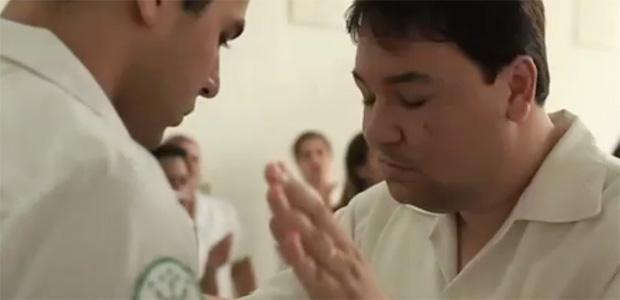Brazil’s Only Indigenous Religion Coming Into Its Own
Practitioners of Umbanda in Brazil. (Photo: Jimmy Chalk)
It's a Saturday night and dozens are gathered at a house in a working class section of Rio. On an altar at the front of a large room, a likeness of Jesus — bathed in blue neon lights — stares out as men and women dressed in white uniforms slowly march in a circle.
The people here burn incense and puff on cigars as they move with eyes closed and faces tense. Some are convulsing. All appear entranced.
They say they are mediums, working to become possessed by spirits who have the power to help the living. The spirits — they say — offer "consultations" on health and other personal matters to an audience that's come here for help.
Umbanda may be Brazil's only truly home-grown religion. In relative terms, it's a young faith — started just over a century ago. But its roots stretch back much further.
Umbanda combines indigenous Brazilian traditions with those that slaves brought with them from Africa; add a dash of Catholicism and what's called "spiritism" — whose followers believe the spirit lives on when humans die — and you get Umbanda. Statues of African deities or "orixas" share space on their altars with those of corresponding Catholic saints.
The number of Umbandistas in Brazil is estimated at 400,000 — a small slice in this nation of 200 million.
But it could be much higher.
Many practice secretly — to avoid discrimination, threats, and vandalism — the price they often bear for adhering to a religion many Brazilians consider the devil's work. This is a predominantly Catholic nation, but Umbanda historian Pedro Miranda said discrimination comes mostly from a different corner.
"The Pentecostals preach constantly against the religious acts that occur within the Umbanda temples," he said.
Pentecostals, or Evangelicals, have flourished here in recent decades, and now make up almost a fifth of Brazil's population. Umbandistas say they've always been targets, both before and after the 1989 signing of Brazil's constitution, which protects religious freedom. For years, the threats came from the government — which at times banned the practice or forced followers to register with authorities.
But in 2008, something changed.
One night, just before a service, four young Evangelicals forced their way into the terreiro run by Edimar de Almeida.
"They threw all the images on the ground, all the images on the ground, one after another, the cross of Jesus, Saint George, all the images," Almeida said.
The men were arrested. But the case drew so much attention, police ended up arresting the pastor involved, saying he encouraged the attack. The charge: religious intolerance.
"That was the first time a pastor had been arrested for religious intolerance, ever in Brazil," said Henrique Pessoa of the Rio Police department. "It was a turning point because it prompted the department to track cases of religious intolerance for the first time."
Soon after, complaints of persecution by Rio's Umbanda community spiked. A sign Pessoa said that government intervention has restored their faith in the state.
"We saw a rise in communication. They (the Umbanda followers) were able to report this. Because for a long time, they didn't think the police would deal with it or they were ashamed with their own religious identity," Pessoa said.
Discrimination against followers has by no means disappeared. Historian Pedro Miranda said even now, they often hide their Umbanda faith from friends, family and co-workers. But they shouldn't have to.
"I may not agree with a single word you say," Miranda says. "But I defend your right to say it. I don't agree. But you have the right to say it. That's important."
With the state on their side, that kind of tolerance now has the space to grow outside of the temple walls.
